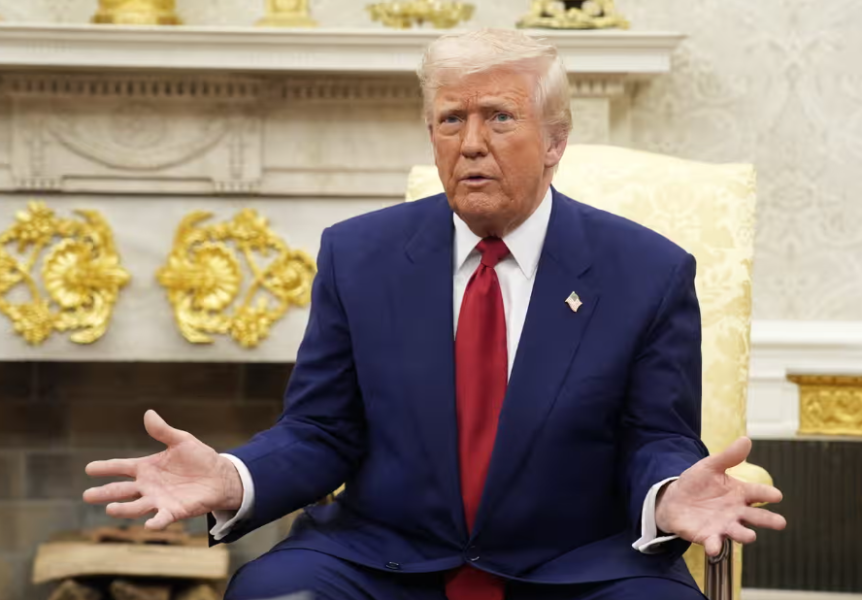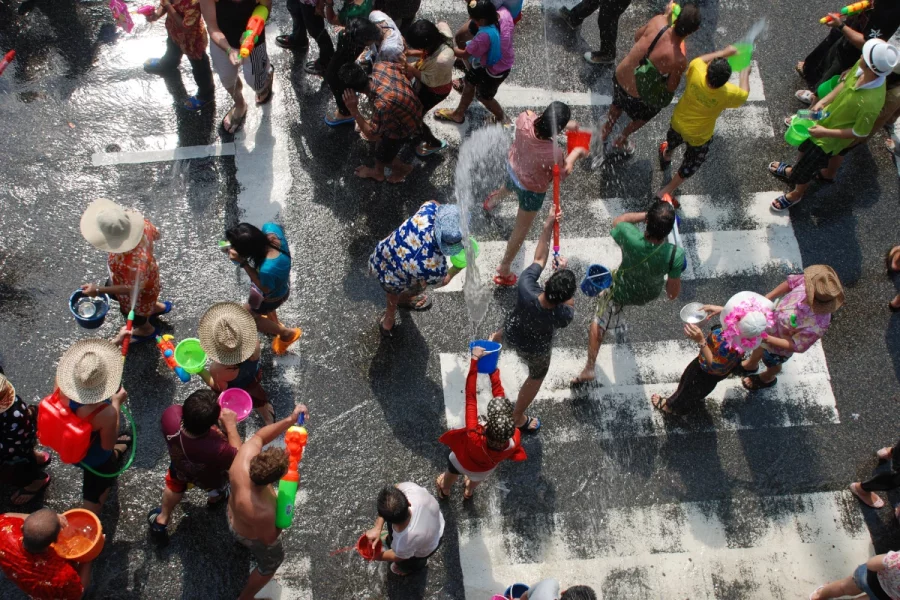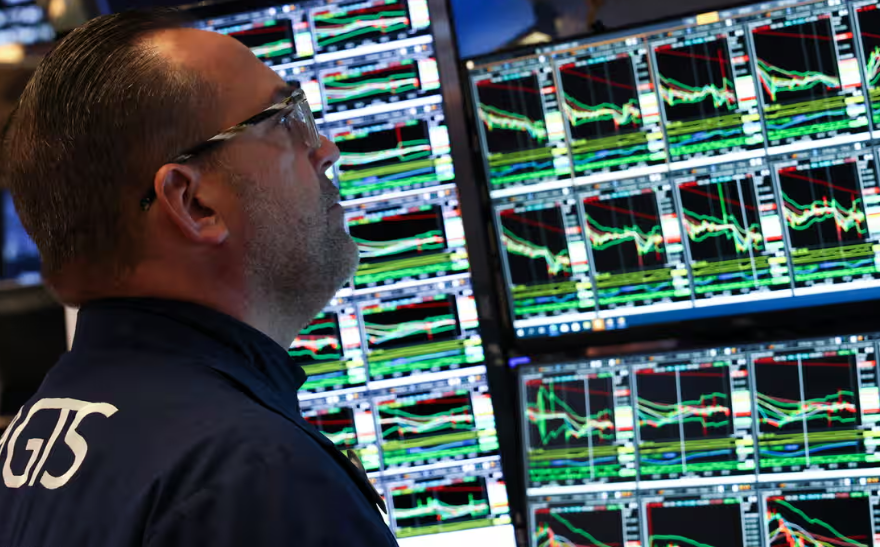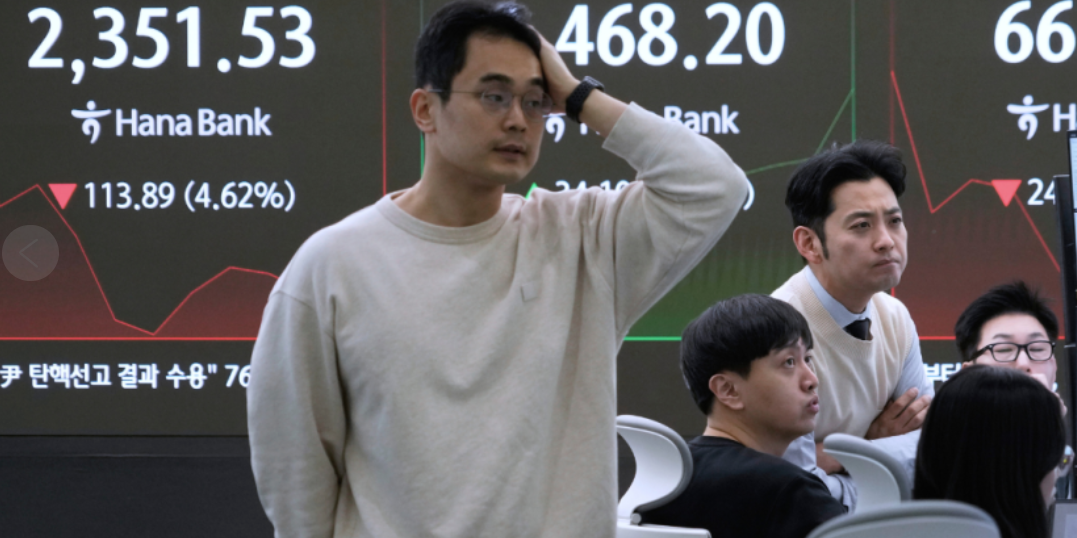-
Posts
36,980 -
Joined
-
Last visited
-
Days Won
5
Content Type
Events
Forums
Downloads
Quizzes
Gallery
Blogs
Everything posted by CharlieH
-

Solar panel package suggestion.
CharlieH replied to kwak250's topic in Alternative/Renewable Energy Forum
MOVED to Alt Energy Forum -
"NOT GOOD ENOUGH" President Donald Trump dismissed the EU’s proposal for a “zero-for-zero” tariff deal on industrial goods, calling the bloc a trade monopoly “formed to damage the U.S.” and vowing to eliminate America’s $350bn deficit through energy exports. Key Developments: Rejection: Trump called the EU’s offer insufficient, claiming the bloc imposes “designed” safety standards (e.g., bowling ball car tests) to block U.S. imports. Energy Leverage: “They’ll buy our energy—$350bn deficit vanishes in a week,” Trump said alongside Israel’s Benjamin Netanyahu. EU Pushback: Brussels disputes the $350bn figure and prepares 25% retaliatory tariffs on U.S. steel/aluminum, set for a Wednesday vote. Why It Matters: The collapse of negotiations risks escalating the transatlantic trade war, with EU officials warning of “extremely aggressive” countermeasures if talks fail. Trump’s focus on energy exports—a sector Europe has historically resisted—reflects a hardline strategy to rebalance trade through unilateral demands. Trade War Timeline: February 2025: EU first proposes “zero-for-zero” deal for cars/industrial goods. April 7: Von der Leyen renews offer, warns of countermeasures. April 9: Trump’s 20% EU tariffs take effect; retaliatory duties begin April 15. Trump’s Grievances: Car Standards: Mocked EU safety tests as “rules designed so you can’t sell U.S. products.” Trade Deficit: Repeatedly cited $350bn gap (disputed by EU economists). EU Structure: Claimed bloc was “formed as a unified force against U.S. trade.” What’s Next: April 10: EU finalizes first tariff tranche targeting $4bn in U.S. goods. Energy Gambit: U.S. pushes LNG exports to replace Russian gas, testing EU unity. Market Fallout: Global stocks remain volatile as tariff deadlines loom. 08.04.2025
-
While on a trip to Thailand, many get the same idea to hop on a motorbike and explore the Kingdom. While it is both convenient and a thrilling experience, a harsh reality lies beneath the freedom. Thailand has one of the world’s highest road fatality rates, and motorbike riders are the most at risk. For expats, understanding the dangers and protecting yourself with proper insurance is not just smart—it’s essential. Thailand’s motorbike danger Thailand tops ASEAN countries in road traffic deaths, with 32.7 fatalities per 100,000 people—far above the regional average. Globally, it ranks 9th in road deaths, with over 20,000 lives lost each year, 74% of which are motorcyclists. That’s around 60 deaths per day. More than 500 billion baht is lost annually due to traffic-related deaths and injuries. These numbers aren’t just stats—they reflect real people, including many expats and tourists who underestimate the risks of riding in Thailand. The biggest causes of motorbike accidents in Thailand include: Speeding and reckless driving Poorly maintained roads, especially in rural areas Lack of experience with Thai traffic norms Minimal riding training Alcohol and drug use Together, these factors create a high-risk environment for locals and foreigners alike. What happens when accidents strike? Motorbike crashes often result in serious injuries. The most common include: Bone fractures (simple and complex) Head trauma, especially without proper helmets Road rash, deep cuts, and internal injuries Long-term disabilities requiring extensive recovery Treatment for these injuries can be extremely costly. Even a basic hospital stay for a fractured bone can exceed 100,000 baht. Surgeries, rehabilitation, and follow-up care can push the total well into the millions of baht. Why expats need comprehensive health insurance in Thailand Unlike Thai nationals, expats aren’t eligible for government-subsidised healthcare. This means you’re fully responsible for any hospital bills, ambulance costs, surgeries, or repatriation. Language barriers can further complicate emergency care and treatment decisions. SafetyWing Nomad Insurance provides essential coverage for digital nomads who rely on motorbikes. The plan includes: Medical expenses: Up to US$250,000 for hospital bills, surgeries, and medication. Emergency evacuation: Up to US$100,000 for transport to better-equipped hospitals. Personal liability: Covers up to US$25,000 for legal claims and property damage. Accidental death & disability: Financial support for severe injuries or fatalities. To qualify for coverage, riders must: Have a valid motorcycle license (including an International Driving Permit if required). Wear a helmet and safety gear. Avoid reckless behaviour, including riding under the influence. Why choose SafetyWing? Unlike many insurance providers, SafetyWing includes motorbike accident coverage as part of its standard plan. Benefits include: Worldwide protection: Coverage in 180+ countries. Flexible sign-up: Policies can be purchased anytime, even after starting a trip. Automatic renewals: Continuous coverage every 28 days without gaps. No hidden restrictions: Covers all engine sizes, provided traffic laws are followed. Without comprehensive health insurance, you’re taking a massive gamble. Protect yourself, your wallet, and your future with SafetyWing Nomad Insurance today because in Thailand, proper coverage isn’t just a precaution—it’s a necessity. Explore SafetyWing’s plans here. Sponsored - Original article by The Thaiger
-
Songkran marks the Thai New Year, celebrated with water fights, cultural rituals, and quality time with loved ones. While it's a festive time, the intense heat, crowds, and water play can also pose health risks. Here’s how to stay safe during the celebrations—and why having health insurance like Cigna can offer peace of mind. Health risks from dirty water During water fights, the water used may contain bacteria, viruses, or fungi, leading to: Eye infections, especially for contact lens wearers Colds and flu, from inhaling contaminated droplets Skin rashes or infections, particularly on cuts or irritated skin Simple precautions: Drink only bottled, boiled, or filtered water—tap water isn’t safe Wash hands often, or use hand sanitiser if soap isn’t available Stay away from dirty water sources like rivers or ponds Check with your doctor before travel about vaccines like typhoid or cholera If you do fall ill, Cigna gives access to quality hospitals and fast treatment, helping avoid large medical costs. Ideal for tourists and expats alike. Avoiding heat-related illness April is Thailand’s hottest month, with temperatures in Bangkok or Chiang Mai often reaching 35 to 40°C. This can lead to heat exhaustion or heatstroke. Watch for symptoms like dizziness, fatigue, or nausea. Stay cool by: Drinking plenty of water—aim for 8 glasses a day Limiting alcohol, sugary drinks, and caffeine Taking breaks in shade or air-conditioned areas Try to avoid the sun between 11am to 3pm Wearing loose, light-colored clothing and a hat Stay safe in busy celebrations Water games and crowded streets can increase the risk of slipping or injuries. Wet roads, playful shoving, and packed venues are common during Songkran. How to prevent injuries: Wear shoes with good grip—avoid smooth soles or flip-flops Walk, don’t run, on wet surfaces Be cautious in crowds—watch your step and avoid pushing Carry a secure bag and leave valuables at home Stay hydrated and know how to exit busy areas if needed Eating street food safely Thai street food is delicious, but during Songkran’s hot season, but we never know how its cooked or stored, which can lead to food poisoning if we’re not careful. What to watch for: Choose clean, busy food stalls with fresh, hot meals Avoid undercooked or raw food, especially meat and seafood Wash your hands before eating or use hand gel Observe how food is handled and cooked When to get medical help Some symptoms should not be ignored during Songkran: High fever (over 39°C) or lasting more than 3 days Signs of dehydration, like dry mouth, dizziness, or dark urine Severe stomach pain, vomiting, or blood in stool Injuries that are deep, swollen, or bleeding heavily How Cigna supports you With Cigna, travellers and expats can enjoy Songkran stress-free, knowing they have access to trusted care whenever needed. Here are some benefits: Emergency care at leading Thai hospitals Outpatient coverage for less serious symptoms Wide hospital network for quick treatment even during peak periods No doubt that Songkran is a fun and lively celebration, but safety matters. Stay healthy by drinking safe water, protecting your skin and eyes, eating well-prepared food, and knowing when to seek help. Having reliable insurance like Cigna ensures you get quick, quality care throughout the festivities. Sponsored - Original article by The Thaiger
-
The Australian dollar crashed to 59.64 US cents—its lowest level since April 2020—as markets reeled from Donald Trump’s “Liberation Day” tariffs, threatening higher prices for imports and overseas travel. Key Developments: Historic Lows: AUD fell over 6% in a week, hitting 59.64¢ against the USD and below 90 yen for the first time since 2023. Market Meltdown: ASX lost $160bn in value as fears of a global trade war intensified. Retail Shock: E-commerce experts warn of imminent price hikes for US-linked goods, including Temu and Shein purchases. Why It Matters: A weaker AUD means higher costs for everything from electronics to overseas holidays, with travelers to Japan, Indonesia, and India facing steeper expenses. The currency’s slump reflects fears that Trump’s tariffs—and retaliatory measures from China and the EU—could trigger a global recession, crushing demand for Australia’s iron ore and other commodities. Sector Impacts: Retail: Prices for US-dollar-pegged imports will rise “significantly,” warns e-commerce analyst Kelly Slessor. Travel: Japan trips lose appeal as AUD buys under 90 yen (down from 100+ in 2024). Commodities: Iron ore demand at risk if China’s economy slows amid trade hostilities, says AMP economist My Bui. Global Ripple Effects: While the euro and yen gained against the USD, currencies of trade-reliant nations like India and South Korea fell. Markets now price in a “worst-case scenario” where Trump’s 10% global tariffs escalate into a full-blown trade war. What’s Next: Consumers are urged to buy now before retailers adjust prices upward. Meanwhile, the RBA faces pressure to cut rates further, with analysts warning the AUD could test 55¢ if China’s growth falters.
-
Autopsies on 15 Palestinian paramedics and emergency responders killed by Israeli forces in Gaza reveal they were shot in the upper body with "intent to kill," according to the Palestinian Red Crescent. The organization is calling for an international investigation into what it describes as a deliberate attack on humanitarian workers. The killings occurred on March 23 in Rafah, southern Gaza, during a renewed Israeli offensive. Video footage from one of the victims shows clearly marked ambulances with flashing lights and personnel wearing high-visibility vests moments before they came under fire. The footage contradicts Israel’s initial claim that the vehicles were “suspicious” and lacked proper identification. International Outcry: Germany, one of Israel’s closest allies in the EU, has called for an urgent investigation, with its foreign ministry stating that accountability is essential for maintaining the credibility of Israel’s constitutional state. The United Nations has also condemned the incident, describing it as a potential war crime after the bodies of the medics were discovered in a mass grave near the site of the attack. Conflicting Accounts: The Israel Defense Forces (IDF) initially denied targeting ambulances, claiming troops fired on vehicles believed to be carrying Hamas militants. However, following the release of video evidence, the IDF admitted its earlier account was “mistaken” but maintained that six of those killed had links to Hamas—a claim for which no evidence has been provided. Lt. Gen. Eyal Zamir, Israel’s army chief, has ordered a deeper investigation into the incident after an initial review concluded that troops acted out of a “sense of threat.” The Red Crescent and other humanitarian organizations have refuted any connections between their personnel and armed groups, emphasizing that all those killed were unarmed civilians providing medical aid. Demands for Justice: Younis al-Khatib, president of the Red Crescent in the West Bank, stated that all 15 victims were deliberately targeted and called for an independent international commission to investigate. “Why did you hide the bodies?” he asked Israeli forces. “This is no longer about respecting international law—it is about enforcing accountability.” A Pattern of Violence: The attack is part of a broader trend of violence against medical workers in Gaza. In the past 18 months, hundreds of humanitarian staff have been killed by Israeli forces, including six members of World Central Kitchen and several UN employees. Human rights groups accuse Israel of fostering a culture of impunity, with few soldiers ever facing justice for such incidents. Global Impact: The killings have further strained international relations as calls for accountability grow louder. The incident underscores the ongoing challenges faced by humanitarian workers in conflict zones and raises questions about adherence to international law during military operations. Based on various news sources. 08.04.2025
-
President Donald Trump escalated his global trade war Monday, threatening a 50% tariff on all Chinese imports unless Beijing rescinds its retaliatory 34% duties by Tuesday—a move that would push total U.S. tariffs on Chinese goods to 104% and risk collapsing the world’s largest bilateral trading relationship. Key Developments: Trump’s Ultimatum: “If China doesn’t withdraw its 34% increase by tomorrow, we’ll enforce ADDITIONAL 50% tariffs and terminate all talks,” Trump declared on Truth Social, calling the measures “America First in action.” China’s Retort: Beijing accused the U.S. of “economic bullying,” vowing to “safeguard legitimate rights” through countermeasures. Market Chaos: Hong Kong’s Hang Seng plunged 13% Monday—its worst drop since 1997—while the FTSE 100 and DAX fell over 4%. U.S. indexes opened sharply lower before a slight Asian rebound Tuesday. Tariff Math: Current U.S. Tariffs: 20% (March) + 34% (April) = 54% baseline. Proposed Addition: 50% extra = 104% total on $500bn+ annual Chinese imports. China’s Counter: 34% across-the-board duties effective April 10, targeting $150bn U.S. exports. Global Fallout: EU Gambit: Ursula von der Leyen proposed a “zero-for-zero tariff” deal, which Trump dismissed as a ploy by a bloc “formed to damage U.S. trade.” Israel Pivot: Netanyahu pledged to eliminate the $9bn U.S. trade deficit, calling it “the right thing” amid Israel’s incoming 17% tariff. Japan’s Move: A negotiation team heads to Washington as Tokyo seeks exemptions for autos and tech. Economic Impact: U.S. Debt Leverage: Trump linked tariffs to America’s $36tn debt, arguing “we’ve been played for fools” in past deals. China’s Pain Points: 104% tariffs would devastate exporters of electronics (33% of China-to-U.S. goods), machinery (18%), and furniture (7%). American Costs: U.S. oilseed and grain exporters face Chinese retaliation, while Boeing and Pfizer brace for Beijing’s counter-sanctions. Why It Matters: This isn’t just a trade dispute—it’s economic mutually assured destruction. With Trump weaponizing tariffs as “negotiation tools” and China refusing to blink, the world’s two largest economies risk fracturing global supply chains beyond repair. What’s Next: Tuesday Deadline: China is unlikely to withdraw tariffs, triggering Trump’s 50% escalation. Retaliation Wave: Beijing could restrict rare-earth exports or dump U.S. Treasuries. Market Meltdown: Analysts warn the S&P 500 could enter bear territory (-20%) by week’s end Based on a report from the BBC 08.04.2025
-
President Donald Trump announced explosive plans for “direct, high-level” nuclear negotiations with Iran starting Saturday—a claim immediately muddied by Tehran’s insistence that talks will occur through Omani mediators. The diplomatic chaos unfolded as Israeli Prime Minister Benjamin Netanyahu stood alongside Trump, warning that Iran’s nuclear ambitions remain an “existential threat” requiring military options if diplomacy fails. Key Developments: Trump’s Announcement: “We’re dealing with them directly… maybe a deal gets made,” Trump declared, calling Saturday’s talks “very big” but refusing to name participants or location. Iran’s Counter: A senior Iranian official said talks would be indirect via Oman, while Foreign Minister Abbas Araqchi tweeted: “The ball is in America’s court—this is both opportunity and test.” Netanyahu’s Ultimatum: “If diplomacy fails, we’ll act decisively,” said the Israeli leader, referencing Libya’s 2003 nuclear dismantling as a model. Timeline of Escalation: March 2025: Trump sends letter to Ayatollah Khamenei via UAE mediators demanding direct talks within 60 days. April 7: Trump claims talks secured, warns of “great danger” if Iran resists. April 12: Planned Oman meeting, though Tehran denies direct U.S. contact. Nuclear Flashpoints: Enrichment Surge: Reports indicate Iran now enriches uranium to 60% purity—near weapons-grade—with stockpiles exceeding 2015 deal limits by 18-fold. 2015 Deal Collapse: Trump abandoned Obama’s JCPOA in 2018; Iran responded by ramping up enrichment and restricting inspections. Military Threats: Trump vowed “unprecedented bombings” if talks fail, while Israel reportedly prepped strikes on Natanz facility. What’s at Stake: For Trump: A legacy-defining deal to counter Biden’s 2024 campaign critiques of his Iran policy. For Iran: Sanctions relief from $100bn+ frozen assets and oil export reprieves. For Israel: Preventing a regional rival from acquiring game-changing nuclear capabilities. Why It Matters: This isn’t just diplomacy—it’s a tinderbox. With Trump demanding total Iranian capitulation and Khamenei refusing direct talks, Saturday’s meeting risks becoming a stage for mutual humiliation. Failure could trigger Middle East conflagration; success might redefine global nonproliferation efforts. Based on a report from the BBC 08.04.2025
- 1 reply
-
- 1
-

-
The FTSE 100 plummeted to a one-year low just minutes after opening, reflecting a worldwide market downturn sparked by fears of an international trade war. Investors are increasingly worried about a potential recession, following a dramatic sell-off that erased trillions from equity values. This turmoil began after Donald Trump's administration announced expansive tariffs last week. US President Trump, however, remained unconcerned about the significant market drop, describing the tariffs as necessary "medicine" to address deeper issues. Despite his reassurances, global markets remain on edge, with the FTSE 100 experiencing a drastic 5% drop within the first ten minutes of trading. The panic spread across Europe, with Germany’s Dax index tumbling 6.5% and France’s Cac 40 declining by 5.3%. Asian markets mirrored the unrest, as Hong Kong’s Hang Seng index fell over 12%, its most significant decline since the 2008 financial crisis. UK Prime Minister Sir Keir Starmer warned that the "world as we knew it has gone" in the wake of these developments. Meanwhile, billionaire Bill Ackman, a former Trump supporter, called for a pause on the tariffs to prevent an "economic nuclear winter", highlighting concerns about diminishing confidence among global business leaders. Based on a report by The Independent. 08.04.2025
-
Israeli airstrikes turned Gaza into a slaughterhouse overnight, killing over 30 Palestinians—including 15 women and children—as Prime Minister Benjamin Netanyahu flew to Washington for crunch talks with Donald Trump. Tents housing journalists, bread queues, and refugee camps became death traps in the latest onslaught, with harrowing footage showing a reporter engulfed in flames after his shelter was incinerated. Key Developments: Khan Younis Carnage: Strikes obliterated a tent and home, killing five men, five women, and five children. A later attack on journalists’ tents outside Nasser Hospital killed two, leaving six reporters injured—one critical Bakery Massacre: Six Palestinians, including three children, died while queueing for bread in Gaza City. Civil Defence teams dug bodies from rubble as flour stocks ran dry. Refugee Camp Horror: Shelling flattened parts of Jabaliya camp, killing four. At Al-Aqsa Martyrs Hospital, seven more bodies arrived—including a child and three women. Netanyahu’s Washington agenda includes Trump’s controversial 17% tariff on Israel and plans to discuss relocating Gazans—a move rights groups call “ethnic cleansing by another name.” The PM boasted of his “special bond” with Trump as Gaza’s death toll hit 50,695, with 115,338 wounded since October. Humanitarian Collapse: UNRWA warns food and fuel stocks are “critically low” after Israel’s month-long blockade. “People are eating grass,” said one aid worker, as hospitals overflow with burn victims and shrapnel cases. Hostage Stalemate: Hamas holds 59 hostages—24 believed alive—as Israel demands their release before halting the offensive. Netanyahu vowed to “keep fighting until Hamas is destroyed,” despite ICC arrest warrants for him and ex-Defence Minister Yoav Gallant over alleged war crimes. Global Fallout: The White House backs Israel’s resumed bombing campaign, while the ICJ deliberates genocide charges. Meanwhile, Trump’s tariffs threaten to spike prices for Israeli tech imports—a side plot to the main bloodshed. On the Ground: Journalists Targeted: Palestine Today’s Yousef al-Faqawi died in the Nasser Hospital strike. “They’re silencing witnesses,” said a surviving cameraman. Evacuation Orders: Israel told Deir al-Balah residents to flee after intercepting rockets from Gaza. One hit Ashkelon, lightly injuring a man. As Netanyahu lands in Washington, Gaza’s survivors dig mass graves with bare hands. “This isn’t war—it’s extermination,” said a nurse at Al-Aqsa, where children’s body bags line corridors. Based on a report from Sky News. 08.04.2025
- 68 replies
-
- 13
-

-

-

-

-
Apple faces a consumer mutiny as Trump’s “Liberation Day” tariffs threaten to send iPhone prices stratospheric—with the 256GB iPhone 16 Pro potentially tripling to $3,500 (£2,715). The tech giant’s shares nosedived 9.3% in a single day, vaporizing $311bn as analysts warned of “catastrophic” price hikes and a Samsung exodus. Price Surge Breakdown: iPhone 16 Pro: Could rocket from $1,100 to $3,500—a 218% spike Pro Max Shock: $1,599 model may hit $2,300 overnight Budget Blow: Base iPhone 16e to leap from $799 to $1,142 TechInsights reveals production costs for the 256GB Pro model will soar from $580 to $850, with Trump’s 54% China tariff forcing Apple to choose between profit margins and customer loyalty. “Goodbye iPhone, hello Samsung,” trended on X as users vowed boycotts, branding the devices “luxuries” in a cost-of-living crisis. Market Meltdown: The FTSE 100 plunged 5% to a one-year low, mirroring panicked sell-offs across Europe (DAX -6.5%, CAC 40 -5.3%). Asian markets tanked as Trump’s global tariff blitz—including 46% on Vietnam and 26% on India—threatened supply chains. Apple’s India pivot now looks “pointless,” analysts say, with relocation costs dwarfing tariff savings. Consumer Fury: Social Media Storm: “Stop buying iPhones!” demands dominate threads Samsung’s Edge: Lower tariffs on South Korean rivals could flip the market Luxury Label: “You don’t need it—it’s just a status symbol!” Apple’s Dilemma: CFRA’s Angelo Zino warns the firm can only pass 5-10% of costs to buyers without “killing demand.” All eyes are on September’s iPhone 17 launch, seen as Apple’s last chance to mask hikes as “premium upgrades.” Global Fallout: The Nasdaq tumbled 5.8% as tech stocks bled, with Meta, Nvidia, and Amazon joining Apple’s rout. “This isn’t trade policy—it’s economic warfare,” said one analyst as Trump’s 10% baseline tariff hit every import. What’s Next? Apple remains silent, but insiders hint at emergency talks with China and the White House. For now, the message is clear: your next iPhone might cost more than a Caribbean cruise. Based on a Daily Mail story 08.04.2025
-
Federal judges have become the prime obstacle to Donald Trump’s most controversial policies, sparking a historic showdown over whether a single courtroom can halt White House directives for 331 million Americans. Republicans are now racing to rein in judicial power, accusing “rogue judges” of sabotaging Trump’s agenda—while Democrats warn the GOP’s crusade risks dismantling constitutional checks on presidential overreach. Injunction Explosion: Trump’s First Term: 64 nationwide injunctions blocked his policies—more than under Bush (6) and Obama (12) combined. 2025 Surge: Over 14 injunctions issued in weeks, including freezes on mass federal layoffs, birthright citizenship bans, and migrant deportation plans. GOP Counterattack: Bills by Rep. Darrell Issa (R-Calif.) and Sen. Chuck Grassley (R-Iowa) aim to limit judges to case-specific rulings, arguing nationwide orders “usurp presidential authority.” Crucial Cases: Birthright Citizenship: Multiple judges froze Trump’s order denying citizenship to U.S.-born children of undocumented migrants, calling it “blatantly unconstitutional.” Federal Purge: D.C. Judge James Boasberg (Obama appointee) reinstated 16,000 axed federal workers, ruling Trump’s layoffs “arbitrary and retaliatory.” Funding Freeze: Courts blocked Trump’s $3 trillion spending halt, deeming it “irrational and precipitating nationwide crisis.” Republican Fury: “These judges aren’t interpreting law—they’re staging a coup,” fumed Issa, whose bill would neuter injunctions by limiting relief to individual plaintiffs. Grassley accused Democrats of “judge-shopping” in liberal districts—a practice both parties exploit, with Trump now filing cases in single-judge Texas divisions. Democratic Defense: Senate Judiciary Chair Dick Durbin (D-Ill.) blasted GOP “hypocrisy,” noting Trump’s 100+ executive orders—many “clearly illegal”—necessitate robust judicial review. “Should Arizona kids have citizenship while Texas kids don’t?” asked Georgetown’s Steve Vladeck, defending injunctions as essential for uniform rights. Judicial Divide: Nationwide Orders: Obama-appointed judges like Boasberg argue broad rulings prevent “patchwork” enforcement. Targeted Relief: Maryland Judge James Bredar (Obama) recently limited a layoff injunction to 19 states, calling nationwide halts “rare and exceptional.” Supreme Court Showdown: The DOJ has begged justices to end “government-by-injunction,” filing emergency appeals on birthright citizenship and federal contracts. But with SCOTUS split 5-4 on a recent grant freeze case, the Roberts court faces its biggest separation-of-powers test since FDR’s court-packing scheme. Partisan Hypocrisy: Grassley admitted both parties cheer injunctions against opposing presidents: “We accept politics over principle.” But Durbin shot back: “This can’t be one rule for Republicans, another for Democrats.” What’s Next: The House shelved Issa’s bill after GOP infighting, but Grassley’s Senate version gains steam. Meanwhile, Trump’s social media attacks on “Obama judge” Boasberg have drawn rare rebukes from Chief Justice Roberts—setting the stage for a constitutional crisis if SCOTUS greenlights the injunction crackdown. Why It Matters: This isn’t just legal nitpicking—it’s about whether courts can protect millions from policies that might vanish before appeals conclude. As injunctions hit record highs, so do the stakes: weaken them, and Trump’s most extreme orders could take effect unchallenged. Based on a report from The Hill 08.04.2025
-
Global stock markets plunged to pandemic-level lows Monday as Trump’s tariff blitz sparked panic selling, with the S&P 500 teetering on bear market territory and Asian indexes suffering historic crashes. The meltdown follows China’s retaliatory 34% tariffs and Trump’s vow to keep his “beautiful” trade penalties in place despite economic chaos—a crisis analysts warn could eclipse 2008’s financial collapse. Market Carnage: Asia Collapse: Tokyo’s Nikkei 225 cratered 7.8%, its worst day since 2020. Hong Kong’s Hang Seng nosedived 13.2%—its steepest single-day drop ever—while Shanghai’s index lost 7.3%. Europe’s Rout: Germany’s DAX briefly crashed 10% at open before stabilizing at -5.8%, mirroring Paris’ CAC 40 (-5.8%) and London’s FTSE 100 (-4.9%). U.S. Pre-Market: S&P 500 futures sank 3.4%, threatening to push the index into bear territory (-20% from peak), with Nasdaq futures down 5.3%. Tariff Domino Effect: Trump’s 10-50% tariffs on 185 nations—including 34% on China and 20% on the EU—met immediate retaliation. Beijing slapped 34% duties on U.S. goods, restricted rare-earth exports, and blacklisted 11 American firms. “This isn’t a trade war—it’s economic mutually assured destruction,” said Natixis’ Gary Ng. Key Flashpoints: Recession Warnings: JPMorgan slashed U.S. GDP forecasts to -0.3% for 2025, predicting 5.3% unemployment as tariffs bite. Supply Chain Chaos: Howmet Aerospace declared force majeure on Airbus/Boeing parts, while Amazon faces profit headwinds and Tesla halted Shanghai exports. Safe-Haven Rush: Walmart and Costco surged as investors fled to consumer staples; Bitcoin dropped 4% alongside risk assets. Corporate Casualties: Tech Wreck: Apple suppliers TSMC and Foxconn halted expansion plans, citing tariff uncertainty. Auto Apocalypse: Ford shares hit a 12-year low as EU tariffs threaten $2bn in annual losses. Energy Crisis: Chevron warned of $5/barrel oil price spikes if Middle East supply chains fracture. Political Fallout: Trump doubled down Sunday, calling tariffs “medicine” for a “sick” global trade system. But allies revolted: Israel’s Netanyahu seeks tariff relief in Monday talks, while Taiwan proposed zero-tariff negotiations. The EU is compiling a retaliation list targeting Kentucky bourbon and Florida oranges, and India eyes a bilateral deal to avoid U.S. duties. China’s Gambit: State media declared tariffs a chance to “turn crisis into opportunity,” vowing to boost domestic tech and rare-earth dominance. Goldman Sachs warns China’s GDP could drop 0.7% this year, but officials plan rate cuts and industry bailouts. Federal Reserve Dilemma: Jerome Powell faces a nightmare scenario: cutting rates to offset tariff pain risks hyperinflation from import price hikes. “We’re trapped between recession and stagflation,” said former Fed economist David Wilcox. Sector Breakdown: Tech: Nasdaq’s 5.3% drop reflects tariff costs on chips and cloud services. Energy: Brent crude sank to $63.25/barrel on demand fears, hammering Shell and BP. Pharma: Pfizer warned of drug shortages as India restricts U.S. API imports. Historical Parallels: The selloff’s speed—$6 trillion wiped in two days—rivals 2008’s Lehman collapse. But unlike 2020’s COVID crash, this crisis lacks a central bank “bazooka” fix. What’s Next: Fed Decision: Emergency rate cut likely by July, despite inflation risks. Corporate Exodus: U.S. manufacturers face “nuclear winter” unless Trump pauses tariffs, warns billionaire Bill Ackman. Market Reality Check: Citi warns earnings haven’t priced in full tariff impacts: “There’s ample downside left.” Why It Matters: This isn’t just a market correction—it’s a stress test for globalization. With rare-earth supply chains fracturing and SMEs facing bankruptcy, the world faces a choice: capitulate to Trump’s demands or risk a 1930s-style trade collapse. Based on a story by AP 08.04.2025
-
Warning: This article contains distressing content Palestinian detainees released back to Gaza have told the BBC they were subjected to mistreatment and torture at the hands of Israeli military and prison staff, adding to reports of misconduct within Israel's barracks and jails. One man said he was attacked with chemicals and set alight. "I thrashed around like an animal in an attempt to put the fire out [on my body]," said Mohammad Abu Tawileh, a 36-year-old mechanic. We have conducted in-depth interviews with five released detainees, all of whom were arrested in Gaza in the months after Hamas and other groups killed about 1,200 people in Israel and took 251 hostage. The men were held under Israel's Unlawful Combatants Law, a measure by which people suspected of posing a security risk can be detained for an unspecified period without charge, as Israel set out to recover the hostages and dismantle the proscribed terror group. The men say they were accused of having links with Hamas and questioned over the location of hostages and tunnels, but were not found to be involved in the 7 October 2023 attacks - a condition Israel had set for anyone released under the recent ceasefire deal. Some of those freed under the deal were serving sentences for other serious crimes, including the killing of Israelis, but that was not the case for our interviewees. We also asked the Israel Defense Forces (IDF) and the Israel Prison Service (IPS) if there were any convictions or accusations against the men but they did not respond to that question. In the men's testimony: They each describe being stripped, blindfolded, cuffed and beaten Some also say they were given electric shocks, menaced by dogs, and denied access to medical care Some say they witnessed the deaths of other detainees One says he witnessed sexual abuse Another says he had his head dunked in chemicals and his back set on fire We have seen reports by a lawyer who visited two of the men in prison, and have spoken to medical staff who treated some of them on their return. The BBC sent a lengthy right of reply letter to the IDF which laid out in detail the men's allegations and their identities. In its statement, the IDF did not respond to any of the specific allegations, but said it "completely rejects accusations of systematic abuse of detainees". It said some of the cases raised by the BBC would be "examined by the relevant authorities". It added that others "were brought without sufficient detail, without any detail regarding the identity of the detainees, making them impossible to examine". It continued: "The IDF takes any… actions which contradict its values very seriously… Specific complaints about inappropriate behaviour by detention facility staff or insufficient conditions are forwarded for examination by the relevant authorities and are dealt with accordingly. In appropriate cases, disciplinary actions are taken against the staff members of the facility, and criminal investigations are opened." The IPS said it was not aware of any of the claims of abuse described in our investigation, in its prisons. "[A]s far as we know, no such events have occurred under IPS responsibility," it added. Dr Lawrence Hill-Cawthorne, co-director of the Centre for International Law at the University of Bristol, said the treatment the men described was "entirely inconsistent with both international law and Israeli law", and in some cases would "meet the threshold of torture". "Under international law, the law of armed conflict requires you to treat all detainees humanely," he said. "The obligations relating to the basic needs of detainees are unaffected by any alleged wrongdoing. Full Story from the BBC 08.04.2025
-
Dodi Wexler, 55, spent two years fighting a £4,000 fine after she mistakenly booked the wrong Covid test for herself and her three children Credit: Eddie Mulholland In a surprising twist, individuals accused of breaching Covid rules are still being called to court, five years after the pandemic's onset. Many claim they were caught out by rapidly changing regulations, resulting in complex and prolonged legal battles. Recent analysis indicates nearly 130 such cases have been heard in recent months. One notable case is that of Dodi Wexler, a Kensington-based artist and American expat. In December 2020, she flew with her sons to the US for Christmas, only to get stuck due to the UK's January lockdown in 2021. On returning, she mistakenly booked the wrong Covid tests, leading to fines totalling £4,000. After nearly two years of legal wrangling, a court reduced her fine to £400. Wexler described the ordeal as "traumatising," asserting that she acted in good faith and was unjustly treated like a criminal. In a similar story, a London real estate consultant endured a legal nightmare after his phone died, preventing him from displaying his negative Covid test upon returning from Paris. Initially fined £1,295, he managed to have the charges dropped by Border Force after proving that his travel was essential. He described the experience as "Kafkaesque," highlighting the stress and financial burden imposed on individuals during the pandemic's legal aftermath. Data shows that, on average, 11 people have been sentenced each month for Covid-related offences in early 2024, long after restrictions were lifted in February 2022. Of the 30,701 people sentenced, 16 percent faced court after all lockdowns ended, with two-thirds sentenced post-July 2021 when major restrictions eased. Critics argue that these delayed prosecutions are a costly misuse of resources, sparking growing calls for an amnesty. Dr. Karol Sikora, a leading critic of the UK's stringent lockdown measures, describes the prosecutions as an unnecessary burden on the justice system. He insists it's time to move on, given the chaotic and rapidly shifting rules during the pandemic. The ongoing saga highlights the debate over how Covid regulations were enforced and the resulting impact on those caught in the legal net. As the world moves beyond the pandemic, questions remain over how justice should be served for past infractions, especially amid claims of governmental mishandling and public confusion. Is it time to leave these issues in the past, or is accountability still required? Based on a report from The Telegraph. 07.04.2025
-
First put a mesh over the exit of any down pipes. Get those sticky glue plates and slide those into the roof with rat poison on them, they come for the food and can't get off. Retrieve the plate and body days or a week later.replace and repeat.
-
Thanks to @ChuckInBangkok 9ef9f35de6538829253a5e3e350d78b5.mp4
-
MOVED to relevant forum
-

Accused of stealing a Massage girls phone..
CharlieH replied to Don Giovanni's topic in ASEAN NOW Community Pub
Off topic posts removed. -

Accused of stealing a Massage girls phone..
CharlieH replied to Don Giovanni's topic in ASEAN NOW Community Pub
The Pub is a place for casual chat, jokes, and the occasional wild story. A bit of banter is part of the fun. But there’s a line, and some are crossing it. If you’re hanging around just to throw digs or launch personal attacks at another member every time they post, that’s not banter — that’s bullying. Like any good bar, if you can’t keep it respectful, you’ll be asked to leave. If someone’s content isn’t your thing, scroll on. Persistently targeting another member will lead to a loss of posting privileges. Let’s keep The Pub lively — not toxic. -
Ive got the SAME bike, its been up for sale locally for over a year! I think its one of those bikes that you just buy to keep. Mine is a 2017 nowhere near the example yours is but it is younger and only 9k km Cant even get 30 for it.
-
Bangkok is known to bring out your energetic side, but sometimes, you just want to hit the pause button and take things slow. Whether you're craving a quiet escape, a poolside day with a view, or travelling from elsewhere, these five hotels in Bangkok offer the perfect staycation experience. We've put together this list, not ranked in any particular order, but instead beased on the experience of The Thaiger’s editorial team. Please note that some facilities, especially rooftop pools, might be closed due to recent earthquake impacts. Confirm with the hotel before booking. Le Méridien Suvarnabhumi, Bangkok Golf Resort & Spa Located between Suvarnabhumi Airport and the city centre, this luxury resort offers a peaceful stay with stylish rooms overlooking a golf course. The 'Resort Staycation' package includes a deluxe room, daily breakfast for two, 500 baht resort credit, and round-the-clock airport shuttle. Marriott Bonvoy members also earn extra points. Guests enjoy an outdoor infinity pool, a spa, fitness centre, or a wonderful dinner at one of the three restaurants: Favola, Latest Recipe, or Latitude 13º39. Plus, you’re close to MegaBangna and cultural spots like The Ancient City in Samut Prakan. Book your stay 137 Pillars Suites & Residences Bangkok Set in Sukhumvit 39, this hotel blends luxury with comfort. The suites feature personal butlers, stocked wine cellars, and skyline-view balconies. Guests have exclusive access to the Leonowens Club and an infinity pool high above the city. The residence also caters to long-term stays with its own pool and even a golf range. Enjoy all-day dining, rooftop dinners, and classic drinks at Jack Bain’s Bar. Plus, complimentary chauffeured rides in a London cab to Phrom Phong BTS only add to the charm. Book your stay INNSiDE by Meliá Bangkok Sukhumvit In the trendy On Nut area, INNSiDE offers a modern, minimal escape. Rooms are crisp and cosy, ideal for unwinding. But the highlight? The 34th floor rooftop infinity pool with a clear bottom and a panoramic city view. The on-site dining fuses Thai and Spanish flavours, and pets are welcome too—with their own welcome treats. With this much charm, you might forget to leave. Book your stay Banyan Tree Bangkok Located in Sathon, Banyan Tree delivers five-star relaxation. Their Vertigo rooftop bar offers stunning city views, while the in-house spa is perfect for total rejuvenation. Hungry? The in-house Saffron restaurant serves up refined Thai cuisine, and a dinner cruise on the Chao Phraya River brings the city's charm right to your table. Rooms are plush and quiet—just right for switching off. Book your stay Villa Deva Resort & Hotel Bangkok A peaceful hideaway in Sathon, Villa Deva merges Thai design with modern comfort. Each room opens to tranquil courtyards with greenery and water features. The riverside-inspired layout makes this resort feel far removed from the city. At VelaBhirom restaurant, traditional Thai dishes are crafted with fresh ingredients, while Mayraya Bar offers the perfect poolside evening with a glass of wine in hand. Book your stay Want to feel like you've travelled without actually going anywhere? These five Bangkok hotels offer a staycation that feels like a whole other world. Original article by The Thaiger
-

Breakfast in Pattaya - Ongoing Thread as I tour the best spots
CharlieH replied to ChuckInBangkok's topic in Pattaya
The Azure hotel will have breakfast at that time and parking.




.webp.4a8938c972f2ea5797f6d4d9c825da58.webp)
.webp.26efda93c5d637d7b8ca571896b75c8c.webp)
.webp.2fd9cea03516a8099d29a6ac9cbbdf5f.webp)







.webp.63d8ca98c7a9dddc63d7338a9d0be2ca.webp)
.webp.261be718eabe907a2ab0dfc1c8f03f82.webp)
.webp.1c4f77ac7c7c6ee86a626fdef9c06b83.webp)
.webp.720dd52c4bb07f26090f17f68e740d85.webp)
.webp.e8a84571f237804a34c8ab862d13cbd2.webp)